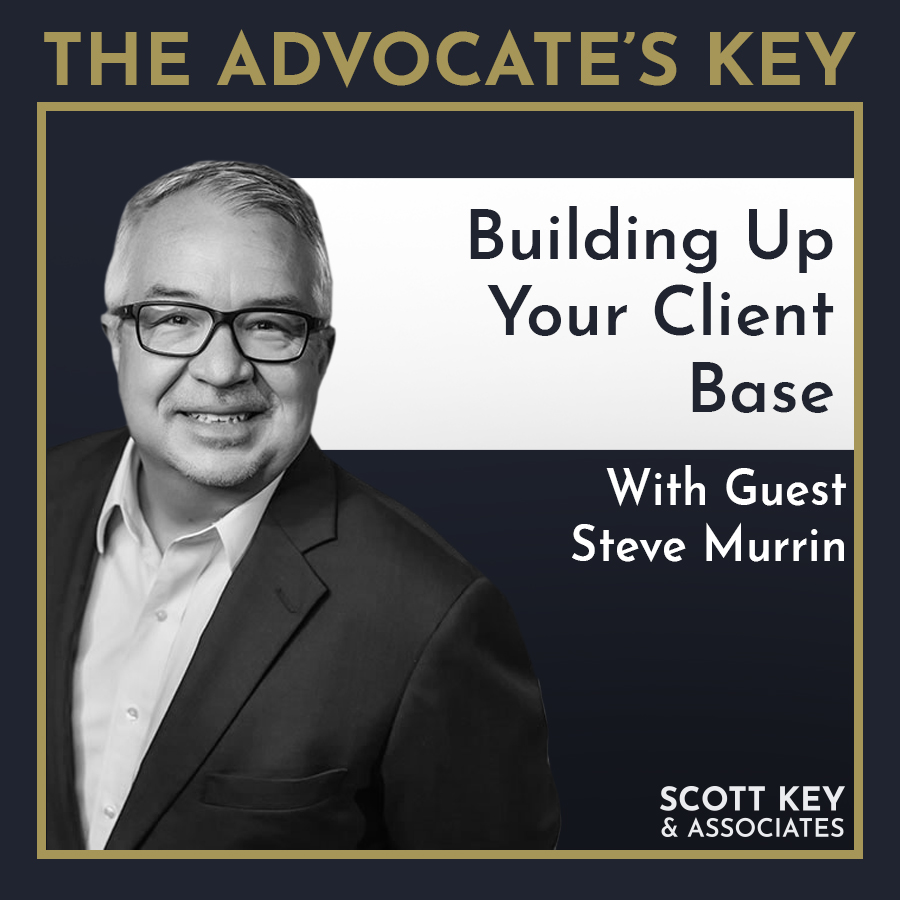Building Up Your Client Base with
Steve Murrin
The “Biker Lawyer” Steve Murrin built his own practice by focusing on connecting with the community through every outlet he could find.
Chances are you’ll leave a conversation with Steve Murrin with something in your hand — whether it be a business card, a hand-written letter or his Facebook username. An experienced lawyer with his own practice, Murrin sees each connection he makes as an opportunity.
It’s especially important because more than half of his cases come from word-of-mouth.
“The lesson is that the older I get and the more mature my practice becomes, the more word-of-mouth becomes important,” said Murrin. “You got to track what gives you business and where you’re failing.”
In this episode, Scott and Murrin talk about how to connect with prospective clients. The “Biker Lawyer” explains how he uses his love of Harleys to find cases, the importance of connecting with your law-practicing peers and how taking the time to say thank-you can change your business.

Finding What Works
In 1999, when Murrin was first building his client-base, he set a goal for himself each day. He aimed to give out 30 business cards to different people each day.
After a couple months of walking and talking to people all over the community, Murrin found it almost impossible to find 30 new people each day.
“It forced you to expand your social network, to expand those individuals you come into contact with,” said Murrin. “I literally had a flow chart of where I had been and who I had given cards to.”
Now, decades later, Murrin’s marketing strategies have changed to adapt with the times, but his core philosophy has not: reach out on as many platforms as possible and track what works for you.

“You have to understand where your cases are coming from. You have to have a general marketing plan that is in writing. It could be on a scrap piece of paper or it could be on a computer algorithm, it doesn’t make any difference,” Murrin explained. “But, you need to decipher what works and what does not work.”
Today, Murrin describes himself as an “internet immigrant.” He’s adapted his practice of connecting with people on all social media platforms, where he engages in Facebook groups, participates in Reddit threads and posts on Instagram to garner more interest in his practice.
One of his biggest takeaways from having a strong social media presence? Keep politics out of your business.
“There’s a line you can’t cross on many of these social media platforms. I’m careful not to overstep boundaries in any particular medium,” said Murrin. “Your business is not political. All you’re going to do is alienate a potential client.
Known for his affinity for motorbikes, Murrin also uses his personal passions to expand his network. He became known as the “Biker Lawyer” once he began to try cases regarding helmet tickets for free — increasing his word-of-mouth popularity.
“If you got in a wreck as a biker, the lawyer that handled your helmet case for free, you’re his lawyer. Forever,” said Murrin. “You’re probably his kids and his grandkids lawyer too.”
Connecting With Other Lawyers
When starting your own practice, one of the most important networks to use is your professional network. In the end, they can serve as one of the most valuable resources for gaining clients.
Murrin was a criminal defense lawyer before he struck out on his own and pursued civil cases. His time working with other lawyers was fundamental to his ability to begin his own practice.
“The lawyers I was battling with would ultimately be my peers. People that were in the trenches seeking justice for a defendant, that’s who I would be aligned with ultimately,” said Murrin. “So I never made an enemy. We fought hard. We were respectful. There was no trickery, there was no withholding evidence. It was all open and honest and ultimately paid off.”
It’s important to remember that your lawyer peers are also a means of growing your business. About 15% of Murrin’s gross income comes from referring clients to other lawyers.
“The network of lawyers you align yourself with, it’s a fun thing. But, the reality is it’s also a cash cow. The more lawyers you know the more referral searches you have. The more friends you have in the legal community, the more opportunities for cases you have,” Murrin explained.

Make sure you have a wide scope of different kinds of lawyers in your network. That way you are able to connect any prospective client with a lawyer who can help them — all the while making money through referral fees.
“Don’t ever say ‘I am a divorce lawyer.’ ‘I am a criminal defense lawyer.’ ‘I am a personal injury lawyer.’ Say ‘I am a lawyer and whatever you need, call me,’” said Murrin. “When you have that person call you, make sure you got a guy.”
To learn more about this show and to follow along with our journey, please rate, review and follow this podcast wherever you listen to your audio content including Apple Podcasts, Google Podcast, and Spotify.
Steve Murrin
